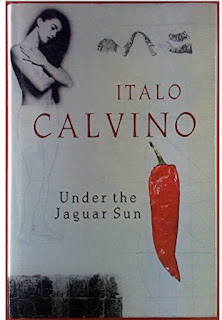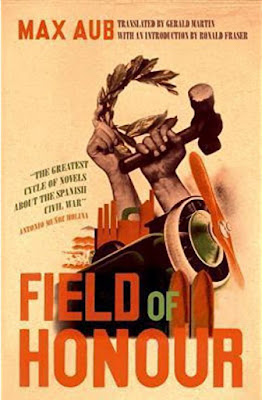Under the Jaguar Sun
Under the Jaguar Sun was published posthumously in 1986 in Italian and 1988 in English, with Calvino passing in 1985, aged 62. Ether Calvino’s note relays that Calvino began the book in 1972, with only three of the stories finished (published here). A few days before he fell ill, Calvino had written about the idea of the framing device (here the five senses) – ‘We consider poetic a production in which each individual experience acquires prominence through its detachment from the general continuum, while it retains a kind of glint of that unlimited vastness’ (p.86). How I would like to hear more!
The title story ‘Under the Jaguar Sun’ is set in Oaxaca,
Mexico (a city I once visited and loved). The narrator and his wife Olivia are
visiting Mexico and while their love life is muted, their sense
of taste is a sensual delight. The narrator speaks of his desire for oneness:
‘Our subjective, individual selves … find their amplification and completion
only in the unity of the couple’. Yet in their present state, our unnamed narrator sees that he
experiences Olivia’s ‘yearnings and throbs’ with this difference: ‘their stage
was no longer the bed of our embraces but a dinner table’ (p.10). So then, our
first sense is taste, and Calvino introduces flavours and responses
(‘garlic, onion, cinnamon, cloves, pepper, cumin, coriander …[p.8]) and then
widens the sense historically to include the questions Olivia asks about the
human sacrifices of the Zapotecs (they visit Mont Albán with a guide). Part of the
final sentence draws together something Freudian, or Totemic – ‘…our teeth
began to move slowly, with equal rhythm, and our eyes started into each other’s
with the intensity of serpents … [reflecting] the universal cannibalism that
leave its imprint on every amorous relationship …’ (p.29).
The second story, ‘A King Listens’, reminds me of The Baron of the Trees in its fable-like qualities. Here a king
sits on his throne and dares not move, keeping so still with his sceptre (‘must
be held in his right hand, erect; you must never put it down’ [p.33]). In this
story, trapped in his throne room (as the Baron was to his trees) the King’s
hearing is heightened and he listens to the various sounds of the palace – both
his subjects, and (in his fears) the various traitors that would dispose of him
as he had replaced the previous king. Then he hears a beautiful singing voice,
introduced with the language of a fairy tale:
There was a voice, a song, a woman’s voice that from time to
time the breeze carried up here to you from some open window; there was a love
song that on summer nights the air brought you in bursts, and the moment you
seemed to have grasped some note of it, it was already lost, and you were never
sure you had really heard it and not simply imagined it, desired to hear it,
the dream of a woman’s voice singing in the nightmare of your long insomnia
(p.54).
The voice involves ‘the pleasure of giving a personal form
to sound waves’ – and yet, even appreciating its fleeting qualities, the king
would not be human if he did not imagine the woman who sings and wish to seek
her out. This disturbance is enough to unsettle the kingdom and for
the king to understand that in chaos, imprisonment in a cell or a throne room is
the same thing. Put another way, he flees into underground passages but now
cannot tell ‘which is you is king and which, prisoner’ (p.62).
So, one story in the first person, the next in the second,
and the final ‘The Name, the Nose’ three interwoven tales involving the sense
of smell. One, an aristocrat in Paris in a bygone age (pre-Revolution, from the
titles of the ladies the protagonist seeks); another, a drummer in a rock band;
a third – primitive man with a club in his hand and his nose (literally) to the
ground. Death is present in these stories – the death of an unsighted lover
whose odour attracts and remains a mystery; the death of a groupie in the
excesses of an orgy of sex, drugs and squalor; and the swinging of a club to
fight a rival male once her scent is
on him.
I enjoyed the variety of the early short stories in Invisible Cities, the fable-like
novellas in Our Ancestors, the
metafictional playfulness of If on a
Winter’s Night a Traveller, and the erudite mind behind the lectures Six Memos for the Next Millennium. Reading
this unfinished book has reminded me of what Calvino offers – suggestive
stories, tantalizing tricks, ponderous poems. Works that seem to say almost
enough, and hint at something more, just out of reach (like a woman’s voice
singing in the nightmare of your long insomnia …).




Comments
Post a Comment